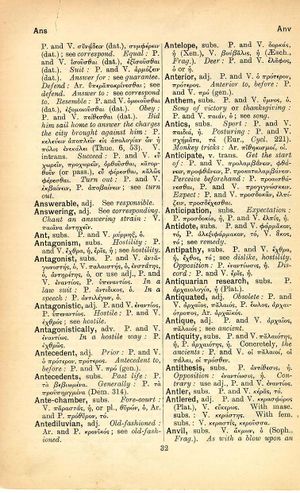antique: Difference between revisions
From LSJ
ἔγνω δὲ φώρ τε φῶρα καὶ λύκος λύκον → the thief knows the thief and the wolf knows the wolf, and thief knows thief and wolf his fellow wolf, set a thief to catch a thief
m (Text replacement - "link={{" to "link={{") |
m (Text replacement - "}}]]" to "}}]]") |
||
| Line 1: | Line 1: | ||
{{Woodhouse1 | {{Woodhouse1 | ||
|Text=[[File:woodhouse_32.jpg|thumb | |Text=[[File:woodhouse_32.jpg|thumb | ||
|link={{filepath:woodhouse_32.jpg | |link={{filepath:woodhouse_32.jpg}}]]'''adj.''' | ||
P. and V. [[ἀρχαῖος]], [[παλαιός]]; see [[ancient]]. | P. and V. [[ἀρχαῖος]], [[παλαιός]]; see [[ancient]]. | ||
Revision as of 10:09, 15 August 2017
English > Greek (Woodhouse)
adj.
P. and V. ἀρχαῖος, παλαιός; see ancient.
Latin > English (Lewis & Short)
antīquē: adv., v. antiquus.
Latin > French (Gaffiot 2016)
antīquē,¹⁴ adv., à l’antique : Hor. Ep. 2, 1, 66 ; antiquius Tac. G. 5 || antiquissime Sol. 11, 16, de toute antiquité.
Latin > German (Georges)
antīquē, Adv. m. Compar. u. Superl. (antiquus), I) alt, nach alter, ehemaliger Art, nimis ant. dicere, Hor. ep. 2, 1, 66: simplicius atque antiquius permutatione mercium uti, Tac. Germ. 5. – II) vor alters, vor alten Zeiten, antiquissime regnasse, Solin. 11, 16.

